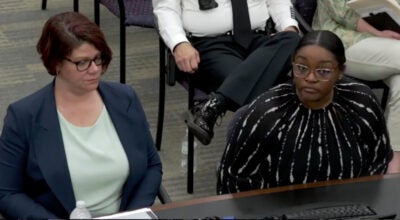School board gets update on progress of renewal planning
Published 12:00 am Wednesday, January 16, 2019
SALISBURY — Six months after Rowan-Salisbury Schools became the state’s first renewal district, Superintendent Lynn Moody said one lesson has hit her boldly.
“It takes a lot more time to transform a district than you think it would, particularly when you’re creating and designing it as you go,” she said.
During Monday’s monthly school board work session, Moody updated board members on the district’s vision for renewal, including a new directional system and a developing set of accountability standards.
The standards would keep all of Rowan County’s 34 schools moving toward a unified target, even though their modalities will be unique at each site, Moody said.
Moody explained that Rowan-Salisbury’s new directional system will have three components: It will focus on honing each student’s academic skills, life skills and interpersonal skills.
A focus on academics is not unique for schools, Moody said.
“It’s No. 2 and No. 3 that make us really different under renewal.”
Moody described unique life skills as focusing on each student’s individual career interest and passion, what they are excited about and what their talents are.
This support will be critical in the coming decades, she said.
“Of students who are in the 10th grade this year, … six out of 10 of them will be working in a job that has not been invented yet,” she said. “When we look at unique life skills, this is more than just saying, ‘Which career are you interested in?’ We’re asking about what great world problem do you want to solve?”
Interpersonal skills also will be important as Rowan’s students move into the working world. “Most people get fired based on their interpersonal skills, not their academic skills,” she said,
Schools will develop a focus on interaction with others, though both life skills and interpersonal skills will require new evaluation techniques to be developed by teacher design teams.
Moody said the Department of Public Instruction will be allocating $50,000 toward the evaluation system this year, likely developed though partnership with a public institution.
But the renewal system does provide schools a certain level of flexibility when it comes to developing plans to move students toward academic, life skills, and interpersonal skills growth.
Moody went on to describe a 12-step process that schools are taking to develop their renewal models, including needs assessments, teacher exploration and parent input.
In one step, the school board would need to iron out its core requirements for the schools: What boundaries does it want to set? What would board members not be comfortable allowing teacher design teams to control?
A recurring topic seemed to be that of finances and teacher pay.
“We worked under the system … that schools aren’t going to get any more money,” Moody said. “Money’s not going to fall down from the sky because we’re a renewal system. We have to live within the budgets that we have.”
Board member Jean Kennedy expressed a concern about how dramatic changes in pay could affect staff morale.
“How is the whole?” Kennedy said. “How are these other employees going to feel valued for what they’re doing when we think about such exorbitant salaries?”
But Moody said the renewal offers opportunities to increase fairness when it comes to employee bonuses and merit pay, varying from state standards.
The state provided bonuses for principals based on growth and average daily membership or merit pay for third-grade teachers based on test scores, she said.
“As a renewal district, we can take that money the state gives us and come up with our own pay system for doing that,” she said. “We don’t have to do what the state does.”
The 12-step plan also includes a need for school board approval for interventions and modalities. Moody presented the board with two options for such: evaluating each school individually or allowing school system staff to work within boundaries to provide a high-level summary for approval.
Ultimately, the board would not decide between the two choices, opting instead to allow more time for dialogue.
Board member Dean Hunter expressed concern about the evaluations and potentially allowing one school to do something without similar provisions for another school.
“I can’t see a win even for administration with you guys deciding who can and who can’t,” Hunter said. “Ultimately, a community doesn’t know much of anything other than it’s always the board’s fault. If one school gets to do it and another school doesn’t, we’re at fault.”
But Moody said some disparities may have to exist for the purpose of experimentation — a sort of “we don’t want to put all our eggs in that basket until we’re sure that it’s working.”
“Where you’re going to see a more radical change with school is where they feel like we haven’t met the measure,” Moody said. “They’re stepping out on a limb to try something differently. … We want them to do that. We want some of our schools to push some of these limits because we think that’s where some of the learning would occur.”



